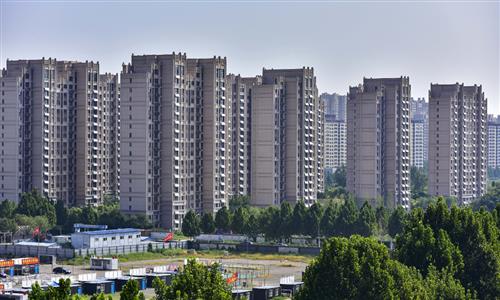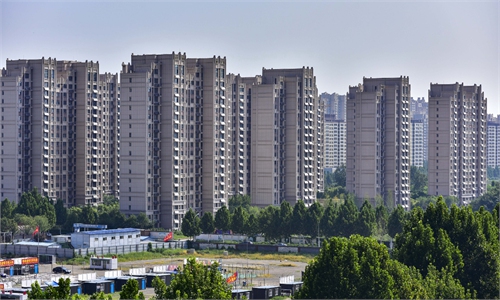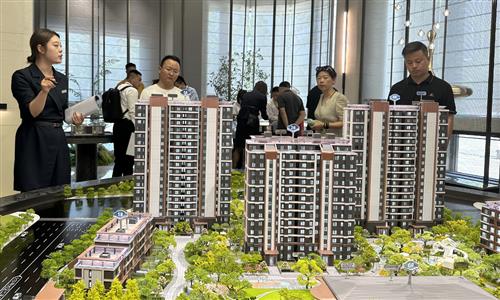China’s four largest lenders plan to cut mortgage rates in September to bolster property sector growth

Citizens visit a property developer's sales office in Ningbo, East China's Zhejiang Province, on March 4, 2023. Photo: VCG
Four state-run banks on Thursday announced adjustments for rules governing first-home mortgage rates, as widely expected by the market, part of the country's ramped-up efforts to bolster the stagnant property sector.
The Industrial and Commercial Bank of China, China Construction Bank, Agricultural Bank of China and Bank of China issued separate statements on mortgage rate reductions, which will take effect on September 25, with banks and borrowers encouraged to negotiate a rate change or arrange refinancing of existing mortgages.
The adjustment of existing mortgage rates for first homes represents a bold move in terms of policy innovation, which is expected to shift market dynamics, Yan Yuejin, research director at Shanghai-based E-house China R&D Institute, told the Global Times on Thursday.
"On the surface, the adjustment seems to prevent an increase of early repayments but it actually shows the government's support for the property sector. With a reduced monthly payment thanks to low rates, the balance of people's bank accounts will rise, as will their spending power," Yan said.
A recent analysis by investment bank China International Capital Corp forecast that the average reduction for first-home mortgage rates would be 50 basis points, which could translate to economy-wide savings of 200 billion yuan ($27.31 billion) among home buyers.
That's equivalent to 0.5 percent of retail sales in China last year.
As of the end of June, Chinese lenders held 38.6 trillion yuan in outstanding individual mortgage loans, statistics showed.
The cut on existing first-home mortgage rates together with the ease of home purchase restrictions in major cities is likely to enhance market confidence and expectations in the property sector, Yan added.
On Friday, Beijing and Shanghai eased mortgage rules to stabilize the real estate sector, two days after Guangzhou and Shenzhen adopted similar adjustments. The four cities are designated as first-tier cities, where home-buying policies tend to be the strictest.
Also last week, China's top financial regulators, including the People's Bank of China, the central bank, and the National Administration of Financial Regulation, jointly issued a notice to lower down payments for both first- and second-time home-buyers, while further cutting interest rates on existing mortgages, aiming to better meet housing demand and promote the healthy and steady development of the real estate market.
The minimum down payment ratios for first-home purchases nationwide will be no less than 20 percent, down from 30 percent previously, and those for second-home purchases will be no less than 30 percent, down from 40 percent previously, according to the notice.
The roll-out of support measures comes amid the fizzling of China's property sector, which has entered a downward spiral post-pandemic.
Last year was a tough one for the sector, with property investment falling 10.0 percent on a yearly basis, the first decline since records began in 1999.
A meeting held by the Political Bureau of the Communist Party of China Central Committee in July called for an adaption to a new situation, where major changes have taken place in the relationship between supply and demand in China's real estate market.
With an array of optimized measures being put into place, the property sector will soon achieve a soft landing, which is of great significance to stabilizing economic growth and defusing risks in the remainder of the year, experts said.
Tian Yun, an independent macro analyst, told the Global Times that the property sector is likely to recover by the third quarter of 2024.
Global Times



